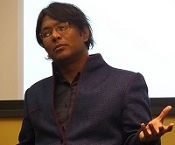Arindam Dutta Lecture
Fall 2014 Lecture
“Peer Review / Censorship”
Featuring Arindam Dutta, Associate Professor of Architectural History and Director of the History, Theory, Criticism Program in Art and Architecture and the SMArchS Program at MIT
Nov. 17, 2014
Debates regarding censorship tend to paint the censor in the form of a supervening power (the state, a bureaucracy, the demotic mob, corporate media, etc.) producing a barrier between something called “free speech” and its untrammelled, unmediated reception by the public sphere. A world without censorship, one would thus assume, would be a world without communicational turbulence, where speech impeccably mirrors certain truths that are then received by their audiences sans noise or interference.
This talk contests such a conception of free speech, one whose rights would seem to stem from outside precinct of “nature” and natural right: censorship is not so much an obstruction in some linear passage of self-evident, pre-political truths from addressor to addressee but reflects a contest over the political domain as such, a battle over the composition of the state rather than against it. The talk takes up a string of recent examples of censorship in India, pertaining to works of art or scholarship, particularly those driven by the religious (Hindu) right. It argues that the liberal critique of censorious cultural nationalisms — however necessary — nonetheless occludes a more robust questioning of the inherent complicities between free speech and censorship. Rather than proclaim, yet again, an end to censorship, the talk invites us to think of democratic politics as necessarily mediated by various forms of censorships to which various groups willingly subscribe.
Censorship, simply put, must be seen as inherent in any kind of social contract. Academic peer review, where a “community” of “qualified” scholars/censors hides behind the veil of anonymity to pronounce on the verifiability of scholarly propositions, is an example in point. It also instantiates precisely the problem in question.
Professor Arindam Dutta
 Featuring Arindam Dutta, Associate Professor of Architectural History and Director of the History, Theory, Criticism Program in Art and Architecture and the SMArchS Program at MIT
Featuring Arindam Dutta, Associate Professor of Architectural History and Director of the History, Theory, Criticism Program in Art and Architecture and the SMArchS Program at MIT